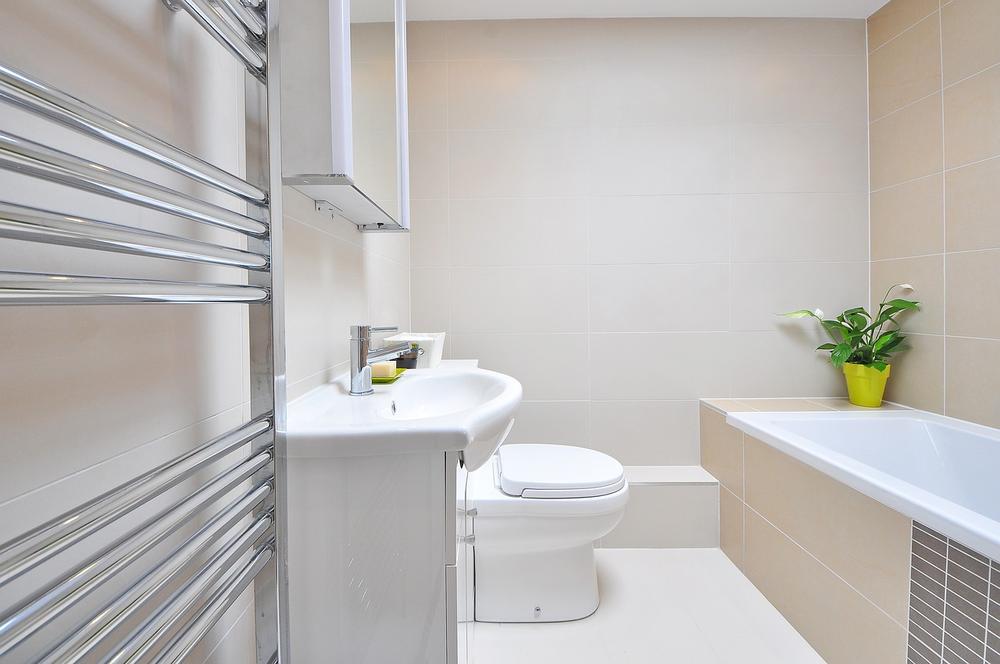Should You Lock Your Cat in a Bathroom at Night?

Tired of the midnight symphonies played by your prowling feline friend?
Wondering if locking them in the bathroom at night is the solution? 😺
I get it, trust me.
Just imagine:
You're nestled under the covers, drifting off to dreamland, when suddenly, Mr. Whiskers turns into a professional opera singer.
It's enough to make you question your sanity.
But let's not lose hope just yet.
Ready to navigate the mysterious realms of cat psychology?
Let's find some answers, shall we?
Is It Safe to Lock Your Cat in the Bathroom at Night?
So, you're wondering if it's safe to lock up your cat in the bathroom while you sleep?
Alright, let's discuss this.
First things first, create a safe environment for your furry friend.
Check for any potential dangers like exposed electrical cords or toxic cleaning supplies lurking in cabinets that could harm your buddy.

You also want to ensure there are no small objects lying around that your cat might accidentally swallow and choke on.
Once you've taken care of those safety measures, you can think about keeping your cat in the bathroom overnight.
However, there are a few more things you need to consider:
- Comfort is crucial. Make sure your bathroom is cozy for your cat. Toss in a comfy bed or blanket, some toys, and maybe even a scratching post.
- Your cat needs access to essential resources like food, water, and a litter box. You don't want them feeling trapped and uncomfortable, so keep these necessities within reach.
- Be smart and avoid potential hazards in the bathroom. Watch out for open windows and anything else that could pose a danger to your cat. Keep it cat-proofed!
- Consider your cat's personality. Some cats may not take well to being confined in a small space, especially at night. If your feline pal gets anxious or stressed when locked up, this might not be the best option for them.
Every cat is unique, so take into account their individual needs and preferences before making the decision to confine them in the bathroom overnight.
And if you're still wondering about whether it's safe to confine your cat at night, I have just the article for you! In my blog post, Can I Keep My Cat in the Garage at Night, I explore the safety and considerations of keeping your feline friend in the garage.
It's a must-read for those curious and concerned about finding the best sleeping arrangement for their furry companion.
Is It Humane to Lock Your Cat in the Bathroom at Night?
Understanding your individual cat's comfort level with confinement is crucial.

Some cats may feel anxious and distressed when locked up, while others find it soothing and secure.
Being left alone for extended periods can be traumatic and frightening for them.
Is It Cruel to Lock Your Cat in the Bathroom at Night?
The bathroom can serve as a safe haven for your cat at night.
If you want to ensure their well-being, consider locking them in there.
Cats are natural explorers and sometimes that curiosity gets the best of them when you're not around.
By confining them to the bathroom, you create a secure area where they can roam freely without encountering any danger.
When deciding whether to lock your cat in the bathroom at night, think about their essential needs.
Make sure they have access to food, water, a litter box, and some toys to keep them entertained.

This way, they won't feel neglected or bored while spending time in the bathroom.
Take into account the comfort and safety of the bathroom and its location within your home.
Ensure the temperature is just right.
You don't want it to be too hot or too cold for your cat.
What's more, if you live next to a busy road or have other potential hazards, keeping your cat indoors during the night is a wise choice.
By locking your cat in the bathroom, you prevent any late-night adventures that could lead to accidents or injuries outside.
As long as the cat has enough space to move around comfortably and has access to their essential resources, confining them to the bathroom at night can actually provide them with a sense of security and peace.
What Are the Potential Risks of Locking Your Cat in the Bathroom at Night?
Locking your cat up in the bathroom at night might seem like a good idea, but there are some things you should think about:
- Your cat may develop behavioral issues because of being isolated for so long. They could start meowing loudly, scratching at doors, or even become more aggressive.
- To tackle these issues beforehand, make sure your cat has plenty of toys and activities to keep them occupied while they're confined. 🐱
- It also helps to provide a comfy bed and cozy hiding spots to reduce stress.
- Before bedtime, playing with your cat can tire them out and encourage better sleep during the night.
- If your cat gets locked in the bathroom for too long, accidents can happen. They might not have access to their litter box and end up making a mess outside of it.
- So, having a litter box in the bathroom is important, and remember to clean it regularly to avoid bad smells and unhygienic conditions.
- The safety of your home and family is crucial, so think about all the possible consequences before locking your cat in the bathroom and take necessary precautions.
Having said that, it's best to explore other solutions that prioritize your cat's well-being and happiness throughout the night.

But before you make a decision, let's explore some alternative options that prioritize your cat's well-being and happiness throughout the night!
What Are the Alternatives to Locking Your Cat in the Bathroom at Night?
Locking your cat up in the bathroom at night might seem like a good idea, but trust me, there are better options for you and your feline friend:
- Instead, create a safe and cozy spot for your cat somewhere else in your home, maybe a nice corner in your bedroom or a whole separate room with all their stuff.
- Keep them entertained and occupied by providing toys or even investing in a cat tree that they can climb and play on.
- Some cats just don't handle being locked up very well, especially energetic kittens. So, it's best to avoid shutting them out at night, especially in busy places where accidents could occur.
- Letting cats roam free outside during the night increases the chances of accidents happening or even encounters with other animals or people who may not have good intentions.
- Locking cats up in small spaces without any interaction or playtime can make them feel anxious and lonely which can lead to depression.
By adhering to these options, you can guarantee the security of your cat while also granting them the independence they require.
Remember, a happy kitty means a happy owner!
To get straight to the point: If you're curious about how long you can safely lock your cat in the bathroom at night, keep reading further down the blog post. I'll provide all the information you need.
Ensuring Your Cat's Safety When Locked in the Bathroom at Night
Keep your cat safe when locked in the bathroom at night.

Here's what you need to do:
- Make sure all windows and balconies are secure, so your cat won't run away or fall.
- Get rid of any plants that could be toxic if swallowed by your furry friend.
- Check for small objects that your cat might try to eat, and take them out of the bathroom.
- Pay attention to your cat's sleep patterns and behavior since they are active during the day. Create a cozy and safe space for them at night.
- Keep dangerous stuff like cleaning products, medicines, and sharp objects out of their reach.
- If necessary, cover faucets or knobs to prevent accidents or water disasters caused by curious cats.
- Close the bathroom door to keep your cat away from harmful toilet water if they decide to sip it.
- Ensure that your cat can easily access food, water, and a litter box while confined to the bathroom.
- Always remember to close the toilet lid to maintain cleanliness and avoid any mishaps.
- Place a litter box inside the bathroom to prevent your cat from urinating elsewhere.
Safeguard your cat in the bathroom during the night by adhering to these suggestions. 😺
How to Make Your Cat Feel Safe and Secure in the Bathroom at Night?
The bathroom is a potential danger zone for your cat at night.
So, make it safe by removing harmful items like medications and cleaning supplies that can harm your furry friend.
Keep these out of reach.
To help your cat feel cozy and secure in the bathroom at night, give them a comfortable place to sleep.
It could be their favorite bed, a cardboard box, or even just an old towel.
Cats love having their own spot to curl up and rest.

Don't forget to add a personal touch!
Leave something with your scent in the bathroom. This will provide comfort and reassurance, especially if your cat feels anxious or scared.
Not all cats respond well to confinement.
Pay attention to your cat's behavior and body language when they are in the bathroom. If they seem hyper or anxious, try giving them access to a larger area where they can roam freely. The goal is to make them feel safe and secure while ensuring their needs are met.
In summary, kitten-proof the bathroom, create a cozy space for your cat, understand their response to confinement, and prioritize their comfort and well-being.
But what about keeping your cat entertained and mentally stimulated while confined in the bathroom at night?
Trust me, you don't want to miss these tips!
How to Provide Enrichment for Your Cat When Locked in the Bathroom at Night?
Being locked in the bathroom at night can be boring and lonely for your cat. However, there are several things you can do to provide enrichment and keep them entertained during this time.
Here are some tips to make it a better experience for your feline friend:
- Invest in interactive toys that your cat can play with on their own. These toys often have feathers or catnip, which are known to keep cats engaged and entertained.
- Consider getting puzzle feeders or treat-dispensing devices. These not only stimulate your cat mentally but also provide a tasty reward for their efforts.
- Make sure they have access to a tall cat tree or climbing shelves. This will give them the opportunity to explore their vertical space and keep themselves occupied.
- Spend some quality time with your cat before locking them up for the night. They crave human interaction, so take a few minutes to play and cuddle with them.
- Regular grooming sessions can be soothing for your cat and help reduce anxiety. Brush their fur and check for any fleas or ticks to ensure their comfort.
- Avoid boredom-related behaviors like scratching or meowing by providing appropriate toys and playtime.
- Remove any potential hazards from the bathroom, such as toxic plants or small objects that your cat could swallow.
Transforming your cat's bathroom confinement into a beneficial and fulfilling occurrence for both you and your feline companion is achievable by adhering to these recommendations.
But wait, there's more!
Interested to know how you can gradually transition your cat out of the bathroom confinement?
Read on to discover the gradual process that allows your furry friend to explore and adapt to different areas of the house.
Don't miss out on this important next step in ensuring their comfort and happiness...
How to Transition Your Cat to Sleeping Outside the Bathroom at Night?
Gradually Open the Bathroom Door at Night
If you're tired of waking up with your favorite feline guarding the bathroom door, it's time for a change.
Let me guide you through smoothly transitioning your cat to sleep outside the bathroom.
Give Your Cat Freedom to Explore
To make your cat feel at home in different areas of your house, start by slightly opening the bathroom door at night.
This way, they can explore other parts of the house while still having access to their familiar bathroom space.
Just like us, cats love to wander and investigate!
Cater to Individual Preferences
You should consider that every cat is unique.
Some may prefer to freely roam around, regardless of how much freedom you give them.
On the other hand, some cats might feel more secure in a confined area.
Pay attention to your cat's preferences and the layout of your home.
You know your furry friend best, after all...
Whether they claim a cozy corner or embark on nighttime adventures throughout the house, as long as they are safe and comfortable, they'll be one happy camper... I mean cat!
Get ready to say goodbye to bathroom-bound nighttime feline sessions and welcome a new era of kitty exploration.
How to Create a Comfortable Environment for Your Cat in the Bathroom at Night?
Creating a comfortable environment for your cat in the bathroom at night is important.
So, here are some practical tips to help you achieve that:
- Choose nightlights with subtle illumination to help your cat navigate without feeling disoriented.
- Cover the bathroom floor with blankets or provide a kitten bed to enhance their sense of coziness and make them feel secure.
- Ensure there is enough space for your cat to move around comfortably. Set up the bathroom layout in a way that allows them to sleep, eat, and rest without feeling cramped.
- Keep the litter box separate from their sleeping area. Cats prefer not to associate their resting space with where they use the bathroom.
- Assess the size of the bathroom before confining your cat at night. Make sure there's enough room for them to move freely and access their bed, food, water, and litter box easily.
- Add familiar scents to create a calming atmosphere. Consider placing their favorite toys, blankets, or catnip in the bathroom to make it feel more comforting.
- Provide vertical spaces like shelves or cat trees. Cats love to climb and having elevated areas will give them a sense of security.
- Use relaxing sounds or music. Playing soft music or turning on a white noise machine can help soothe your cat and make the bathroom feel more inviting.
- Maintain a consistent routine. Cats thrive on predictability, so try to establish regular feeding and bathroom times to promote a sense of security.
Following these tips will ensure that your cat feels safe and comfortable in the bathroom at night, providing them with a peaceful environment for a good night's rest.
And you should remember that while creating a comfortable environment is essential, we must also consider the emotional well-being of our cats...
How to Minimize Stress for Your Cat When Locked in the Bathroom at Night?
To minimize stress for your cat when locked in the bathroom at night, here are some strategies you can try:
- Create a calming environment by using a pheromone diffuser or spray in the bathroom.
- Drown out unfamiliar sounds that might make your cat anxious by playing soft, soothing music.
- Give your cat hiding spots like covered beds or boxes in the bathroom so they can feel safe and secure.
- Don't punish your stressed cat, as it will only worsen their anxiety and lead to more unwanted behaviors.
- Instead, use positive reinforcement by rewarding calm behavior with treats and praise.
- Start with short periods of time locked in the bathroom during the day and gradually increase the duration over time.
- If your cat continues to show signs of stress, it's a good idea to consult a veterinarian or animal behaviorist for professional advice on addressing the underlying causes.
Being patient and understanding is crucial when helping your cat through stressful situations.
And it gets worse...
Locking your cat in the bathroom at night can potentially harm their in essence well-being.
So, what can you do to address their needs and ensure their comfort?
How to Address Your Cat's Physical and Mental Needs When Locked in the Bathroom at Night?
To address your cat's physical and mental needs when locked in the bathroom at night, follow these 10 simple steps:
- Allocate dedicated playtime outside the bathroom.
- Provide engaging toys and scratching posts.
- Make sure the bathroom is comfortable and cat-friendly.
- Consider using calming sprays or diffusers.
- Play soothing music or white noise to help your cat relax.
- Monitor your cat for signs of anxiety or depression.
- Offer interactive feeding toys and puzzles for mental stimulation.
- Keep a regular routine and schedule for bathroom confinement.
- Allow supervised bathroom breaks during the night if needed.
- Consult with a veterinarian if your cat continues to exhibit distress.
Every cat is different, so be patient and attentive to your cat's unique needs and preferences.
How to Prevent Behavioral Issues When Locking Your Cat in the Bathroom at Night?
When it comes to locking your cat in the bathroom at night, you want to make sure they feel safe and comfy.
You don't wanna make the bathroom or being confined a bad thing.
So here are some tips to prevent behavior problems and make it as nice as possible for them:
- Make it cozy: Put their bed, toys, and litter box in the bathroom so it feels like home.
- Ease them into it: When introducing the bathroom, start with short periods during the day and gradually increase the time. This helps them get used to it and reduces anxiety.
- Keep them busy: Leave puzzle toys or treats in there to keep them entertained.
- No punishment: Instead of punishing bad behavior, reward good stuff with treats or praise. This encourages positive behavior and helps them learn what's good.
- Get some calm sounds: Play peaceful music or use a white noise machine to drown out any noises that might scare them.
- Let there be light: Keep a nightlight on so they feel safer and can see better.
Always pay attention to how your cat acts and change things up if needed.
By following these tips, you can avoid behavior issues at night and make it a better experience for your cat.
And now, let's dive deeper into why it may not be ideal to lock your cat in the bathroom for extended periods of time.
I want to highlight the importance of considering their physical and mental wellbeing before resorting to confinement...
How Long Can You Safely Lock Your Cat in the Bathroom at Night?
Locking your cat in the bathroom at night?
Wondering if it's safe and humane?
Let me give you my thoughts.
First off, think about what your cat needs and how they'll feel. Cats are active creatures who need stimulation, exercise, and interaction throughout the day.
So trapping them in a small bathroom might not be ideal.
You're probably wondering how long they can handle it.
Well, it really depends on the cat.
Factors like age, personality, and maturity level come into play.
But experts generally don't recommend locking them up overnight.
Why?
Because being confined like that over and over again can actually harm their health and overall happiness. Not good.
So what's the better option?
Make sure your cat gets plenty of playtime, exercise, and attention during the day. Create an environment where they have space to roam and explore.
Take care of their physical and mental well-being, and they'll be one content kitty.
By putting their needs first, you're ensuring a paw-some night for your feline friend.
Summing it up
Key Takeaways:
- Locking your cat in the bathroom at night can be a safe option if they are comfortable and have access to necessary resources.
- Extended periods of being alone can be traumatic and frightening for cats.
- Consider the temperature and location of your home before locking your cat in the bathroom at night.
- Kittens may need their own separate room or bathroom if they are energetic and disturb your sleep.
- Avoid locking cats in small spaces without interaction or playtime to prevent anxiety and depression.
- Take precautions to ensure the cat's safety, such as removing hazardous items and keeping toxic products out of reach.
- Make the cat feel safe and secure by providing necessary essentials and a comfortable sleeping area.
- Provide toys and a temporary litter box for entertainment and engagement.
- Consider the layout and structure of your house and the preferences of your cat.
- Create a comfortable environment in the bathroom with sufficient space and essential resources.
- Avoid punishment and use positive or negative reinforcement techniques for training.
- Be mindful of your cat's tolerance for being left alone and avoid prolonged confinement.
And that wraps up today's article.
If you wish to read more of my useful articles, I recommend you check out some of these: When to Start Litter Box Training Kittens, Where Should My Kitten Sleep at Night, Cat Not Using Litter Box After Giving Birth, Cat Sleeping Next to a Litter Box, and Cat Humps Toys
Talk soon,
-Sarah Davis